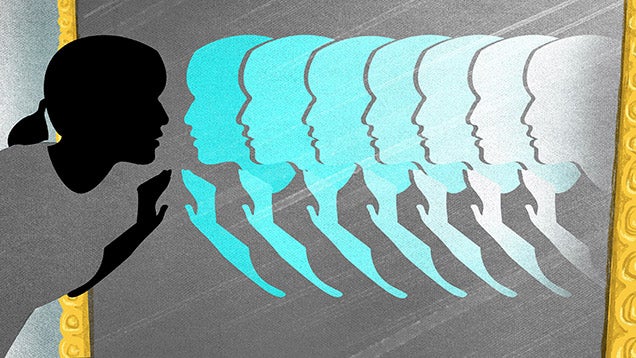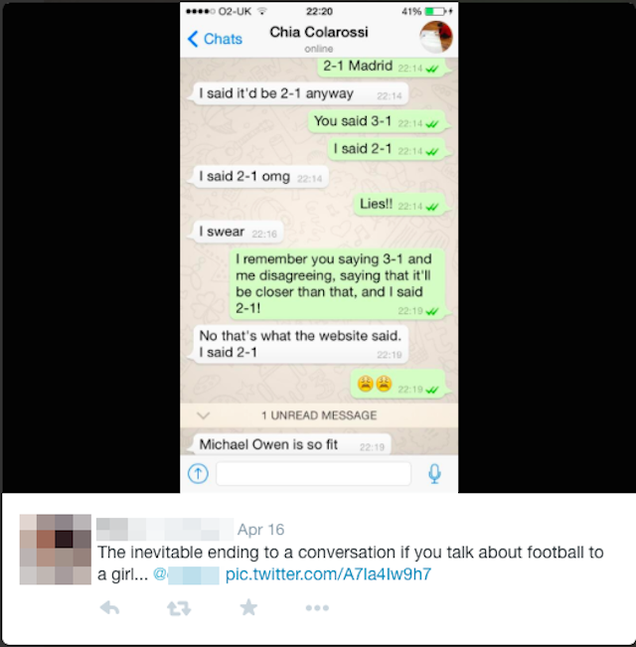
Most of our discussions of catfishing are limited to the catfishers and catfishees, but there's a third category we often forget about: the unwitting catfish-complicit, whose pictures and deets make the catfishing possible, and whose lives also get crappy and complicated when sucked into the mix.
For one startling example, take Ellie Flynn in the U.K., who has dealt with distress, creepiness and in-person mix-ups resulting from having her pictures and those of her many friends cribbed from her social media accounts for years by a woman who appears to be in her social network. Maybe someone she went to school with. Possibly an actual, real-life friend.
Flynn writes for Vice:
Over the years, my friends and I have met a number of young men who've spent a substantial amount of time chatting to fake me—or fake versions of one of my friends—online. They often demand we show some form of ID to prove our surnames aren't "Colarossi," or "Rose," or "Morrison," and each time they're left disappointed. The boy from Malia had been speaking to "Chia" every night on the phone for two months. He believed he was in love with her. I couldn't help but feel for him—though I did find it odd his suspicions hadn't been raised by the fact this cyber charlatan apparently had a family emergency to attend to literally every time they were due to meet.
One such man provided proof of the fake excuses:

In total, Flynn says there are over 60 fake profiles floating around out there on every social media site imaginable—Facebook, Twitter, Instagram, and dating sites—impersonating her and her friends. The impersonators are following her closely:
Every photo we upload is re-posted to Facebook by our respective fake accounts; every job we start is updated on our profiles; every tweet is repeated. It's so believable that I've genuinely considered whether or not there's a parallel group of everyone I know (with slightly different second names) living somewhere in Halifax.
Worse, the eager Romeos being fished with these photos and updates and re-Tweeted witticisms are sometimes showing up to where the real Ellie and Chia live or hang, which indicates further that the person scraping their site for the fake profiles is a "friend," at least in the social media sense, and has access to all pertinent status updates: the real Chia was recently approached in her college dorm.
Flynn speculates that perhaps it's the fake Chia who is the main instigator for all the meet-ups, since it's her fake profile that gets the most tending, and the most activity:
Fake Chia has tweeted 36,000 times. Let me put that into perspective—that's a tweet an hour for more than four years. Using some sort of bizarre reverse psychology, fake Chia sometimes even messages real Chia asking, "Why are you pretending to be me?"
The whole situation is utter fucking madness, and really, really confusing.
Real Ellie and her friends have tried to squash the charade. They've asked Facebook and Twitter to take down the accounts due to fraud, and they've succeeded in some cases, but the fakes always reappear in a matter of weeks. They've even messaged the fake profiles to try to get whoever's behind this to stop:
In an act of desperation a few years ago, I messaged the fake Facebook account of my friend Charlotte, asking why the profiles had been set up, and explaining that I was becoming concerned about the very creepy scenario we'd found ourselves in.
This is the response I received (confusingly, I'd changed my name to "Ellie Rose" on Facebook at the time, but ignore that):

"Charlotte Jean" later told me: "I don't have very many friends at all—I never have had, to be honest. It sounds absurd, but it just makes me feel a little bit better about myself. Nobody talks to me when I'm being myself."
She swore to real Ellie that she would cut out the nonsense, but the pranks continued:
Ten minutes later, I was blocked and "Charlotte Jean" was cracking on as usual. I think she spited me for this confrontation in the fake-profile world, as "Ellie Rose" soon fell out with the gang and moved up to Scotland, according to an ask.fm page I stumbled across.
Another fake profile messaged one of real Ellie's real friends and fell on her sword a bit over the whole to-do as well:
Hey, basically I just wanted to let you know that I am really sorry for the fake accounts I have made of you and your friends on fb/twitter. It has taken me a while but I've finally realised how sick and fucked up it is. I guess I just enjoyed living your lives a bit more than my own. I really am truly sorry and just wanted to make you aware that as of now I promise they are all going to be permanently deleted, it just isn't right of me to carry this on at all and I thought it would be the right thing to do for me to apologise to you and your friends. If you wanna reply to me being abusive and what not then I completely understand.
But nothing changed, and those fake profiles still remain active, according to Flynn, and have been for a staggering eight years now.
This clearly moves beyond basic catfishing into a kind of shadowy world of stalker-like obsession (female stalkers do approach the activity differently than men). It may appear to be harmless and even somewhat funny, but these profiles are being used to send catfishees to the real women's locations. Though most of these encounters end amicably, according to Flynn, it seems inevitable that one of them eventually might not—to say nothing of the fact that having duplicate online presences does damage to these women's reputations. In any world where your Facebook likes threaten your employability, who can willingly hand the keys over to a fake?
This level of catfishing isn't just grabbing a model-pretty picture in the hopes of hooking an online beau. It's emulating real people's actual lives and toying with them in the process, charting and manipulating their social group's actual comings and goings, falsely promising to stop. Catfishers, at least the type featured on MTV, usually fake details about age, gender, location, employment. Right gender, wrong face is the most common type of deception. But it appears to be rarer for people to use the face of someone they actually know, as in this case, where the woman behind this scheme admits she'd seen the real Ellie and friends around London.
Ellie's story puts us more squarely into female-on-female obsession territory. The idea is certainly in the pop culture water, from more benign versions of girl crushes or harmless, excitable worship from afar (all things Bey), to more disturbing portrayals in films of close female friendships that become so intertwined that their identities threaten to merge or switch—see movies Single White Female (and its modern copy, The Roommate), Ingmar Bergman's Persona, Robert Altman's 3 Women, David Lynch's Mulholland Drive.
In most of these cases, what begins as caretaking or innocent admiration of a woman's life by a lonely wallflower type—in 3 Women, for instance, the purposely plain Sissy Spacek tells the primping, magazine-pretty Shelley Duvall that "You're the most perfect person I've ever met"—quickly derails toward a fixation, a desire not just to be near but to be the other.
It's the ultimate escape from the self, particularly when the self is nothing special. Flynn reached out to a shrink for her piece, Dr. Claire Casey, who summed it up:
I think this is going to run and run and run. She probably doesn't have friends or a boyfriend or anyone to talk to—creating these fake profiles allows her to be daring, clever, attractive, and witty, and she can pretend to be something she can't be in real life.
Interestingly, I can't think of anywhere near the number of male-centric examples of this phenomenon in pop culture depictions apart from maybe the Talented Mr. Ripley, where Matt Damon plays a shapeshifter eager to assume the life of Jude Law's wealthy playboy, Dickie Greenleaf, or Nicolas Roeg's Performance, which features another male switcheroo. In both, there are either outright references to bisexuality or homosexuality or strongly indicated currents, suggesting that such boundaries are crossed in a kind of misguided inability to come out.
And of course, there's Don Draper in Mad Men. But his identity theft was less obsession and more opportunistic, not to mention relatively tidier—swiped from a dead man, with his widow's permission, and not, say, a gaggle of women who live in the same city.
Are men just as susceptible to obsessing about other men's lives to the minute detail, only less likely to be portrayed in this way? Or maybe this particularly fetishistic brand of disturbing admiration is more likely to be the province of women for the simple fact that men are given much more direct encouragement to imitate their idols—to dress like James Dean, "be like Mike" or woo like Clooney, or claim any powerful status there for the taking, while women express their adoration for other women more often the same way they express any power at all, through a kind of adjacent status, i.e., the assistant or "the best friend." You don't express the desire to be Jennifer Lawrence or Tina Fey or Amy Poehler; you express the desire to be their BFF.
In other words, for some women, "always the wingwoman, never the woman" is a fact of life. Surely that gets tiresome on occasion, and in the wrong hands, positively disturbing.
Illustration by Tara Jacoby.
from ffffff http://jezebel.com/woman-discovers-her-photos-have-been-used-to-catfish-ot-1681189437
via IFTTT







0 comentarios:
Publicar un comentario